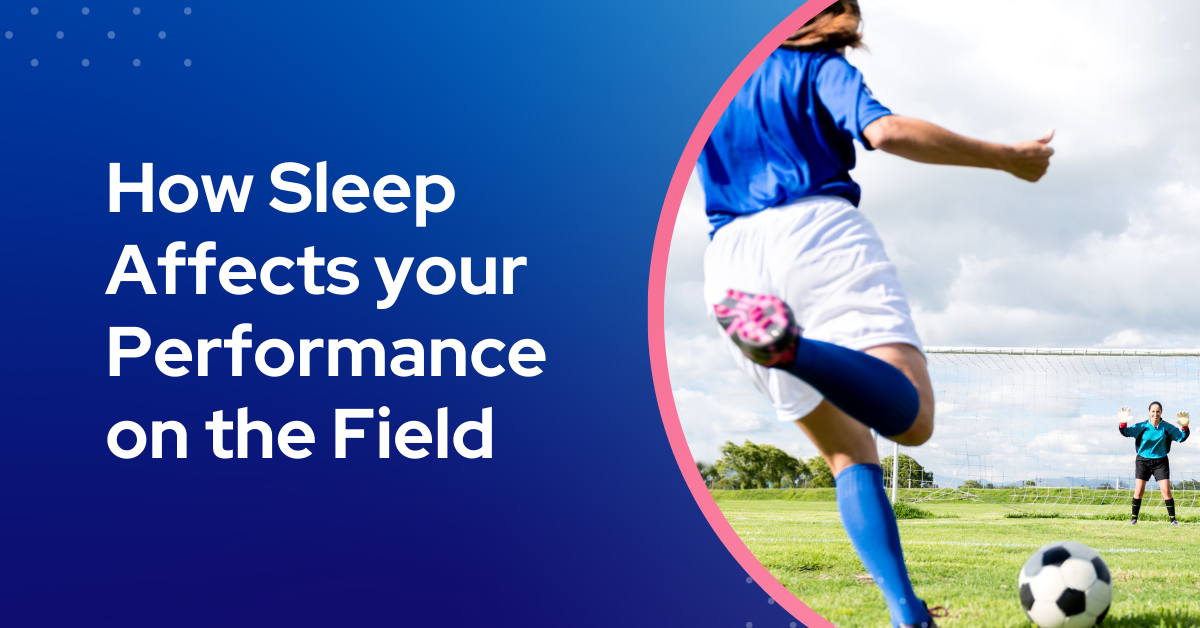Feeling sluggish during practice? Struggling to recover between games? Sleep deprivation can be a silent saboteur of athletic success. Let’s discuss the crucial role sleep plays in physical and mental performance, followed by actionable tips to achieve optimal sleep hygiene for athletes.
Science of Sleep: The Key to Peak Performance
Sleep is a vital physiological process that repairs your body, refuels your energy stores, and sharpens your mind. During sleep, your body releases hormones like human growth hormone (HGH) that promote muscle growth and repair tissues damaged during exercise. It also regulates metabolism, influencing how efficiently your body produces energy from carbohydrates, fats, and proteins. Deep sleep stages are particularly important for cognitive function, enhancing memory consolidation, reaction time, and strategic thinking – all crucial for success on the field.
The Downside of Sleepless Nights
Lacking sleep can cause your athletic performance to suffer. Sleep deprivation can lead to decreased reaction time, making you a split second slower on the court or missing that crucial block. Impaired decision-making can cloud your judgment during a game, leading to bad calls or missed opportunities. Difficulty concentrating can affect your technique and form, hindering your performance and increasing your risk of mistakes.
Sleep deprivation weakens your immune system, making you more susceptible to illness and forcing you to miss training or competitions. It can also significantly increase your risk of injuries. Studies have shown that sleep-deprived athletes are more likely to experience muscle strains, ligament tears, and other overuse injuries.
Sleep Hygiene Tips for Champions
Here are some actionable tips to help get more, and better quality, sleep:
• Become a creature of habit: Establish a regular sleep schedule, going to bed and waking up at consistent times every day, even on weekends. This helps regulate your body's natural sleep-wake cycle.
• Unwind before bed: Develop a relaxing bedtime routine that signals to your body it's time to wind down. Take a warm bath, read a book, practice gentle yoga, or listen to calming music. Avoid stimulating activities like watching TV or using electronic devices for at least an hour before bed.
• Optimize your sleep environment: Make sure your bedroom is cool, ideally between 60-67 degrees Fahrenheit (15.5-19.4 degrees Celsius). Darkness is also crucial, so invest in blackout curtains if necessary. Ensure quiet by using earplugs or a white noise machine if needed. Invest in a comfortable mattress and pillows that provide proper support.
• Ditch the pre-bed latte: Avoid stimulants like caffeine and alcohol before bed, as they can disrupt your sleep cycle. Caffeine can stay in your system for several hours, so avoid it in the afternoon and evening. Alcohol might make you drowsy initially, but it disrupts deep sleep stages later in the night.
• Unwind before bed: Develop a relaxing bedtime routine that signals to your body it's time to wind down. Take a warm bath, read a book, practice gentle yoga, or listen to calming music. Avoid stimulating activities like watching TV or using electronic devices for at least an hour before bed.
• Optimize your sleep environment: Make sure your bedroom is cool, ideally between 60-67 degrees Fahrenheit (15.5-19.4 degrees Celsius). Darkness is also crucial, so invest in blackout curtains if necessary. Ensure quiet by using earplugs or a white noise machine if needed. Invest in a comfortable mattress and pillows that provide proper support.
• Ditch the pre-bed latte: Avoid stimulants like caffeine and alcohol before bed, as they can disrupt your sleep cycle. Caffeine can stay in your system for several hours, so avoid it in the afternoon and evening. Alcohol might make you drowsy initially, but it disrupts deep sleep stages later in the night.
Sleep Disruptions and Breathing
Sometimes, even with good sleep hygiene, athletes may experience sleep disturbances. Factors like snoring or difficulty breathing can significantly impact sleep quality. Snoring disrupts sleep cycles for both the snorer and their partner, leading to fragmented sleep and daytime fatigue. Obstructive sleep apnea, a more serious condition, involves pauses in breathing during sleep, which can lead to oxygen deprivation and a cascade of negative health effects.
Sport Pal: Breathe Easy, Sleep Soundly
Sport Pal is a tongue training device designed to improve breathing patterns during sleep. Here's how Sport Pal can potentially enhance your sleep:
• Reduced Snoring: By gently repositioning the tongue, Sport Pal can open airways and reduce snoring, allowing for quieter and more restful sleep for both you and your partner.
• Improved Oxygen Flow: Better breathing throughout the night ensures your body receives the oxygen it needs to function optimally during sleep and wakefulness. This can improve sleep quality, boost energy levels, and enhance athletic performance.
• Promoting Relaxation: Proper breathing can promote relaxation and deeper sleep stages, leaving you feeling more energized and focused during the day.
• Improved Oxygen Flow: Better breathing throughout the night ensures your body receives the oxygen it needs to function optimally during sleep and wakefulness. This can improve sleep quality, boost energy levels, and enhance athletic performance.
• Promoting Relaxation: Proper breathing can promote relaxation and deeper sleep stages, leaving you feeling more energized and focused during the day.
Prioritize Sleep for Peak Performance!
Prioritize sleep for peak performance! In addition to these tips, some athletes find that Sport Pal, a tongue training device, can improve sleep quality by promoting better breathing. Visit our website to learn more about Sport Pal and how it can help you unlock your full athletic potential!

Share:
5 Powerful Recovery Techniques to Boost Your Workouts
10 Practical Tips For Snorers and Their Partners